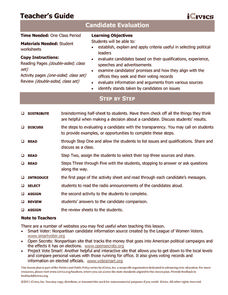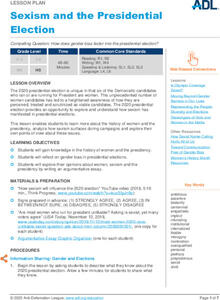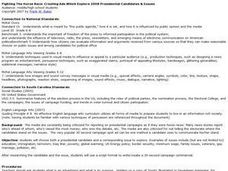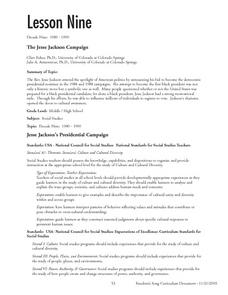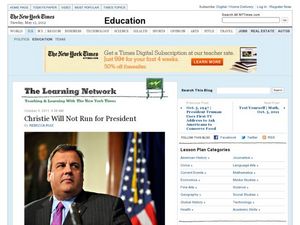National Endowment for the Humanities
The 1828 Campaign of Andrew Jackson: Changes in Voting Participation
Students give examples to indicate how voting participation changed in the first half of the 19th century, and make connections between changes in voting participation and the results of the election of 1828.
National Endowment for the Humanities
The 1828 Campaign of Andrew Jackson: Expansion of the Voting Base
Students give examples to indicate how the franchise was extended and limited in the first half of the 19th century, and cite some differences in the newly enfranchised population that could affect the way they would vote.
iCivics
Candidate Evaluation
How can we decide between candidates on election day? After contemplating various issues and qualities, your learners will go through a step-by-step process of researching and evaluating sample candidates and determining their...
Constitutional Rights Foundation
Options for Affecting Public Policy
Letter-writing, e-mail and telephone campaigns, petitions, marches, meetings, with lawmakers. Options for influencing elected representatives are the focus of resource that details how to craft each of these approaches to influencing...
Anti-Defamation League
Sexism and the Presidential Election
Young historians investigate how sexism impacted the 2020 United States presidential election. They examine media coverage of the six women candidates, engage in a four-corners debate reacting to statements about gender and the...
Brown University
Following the U.S. Presidential Election
Election years provide the opportunity to evaluate news media as well as the next prospective president. High schoolers read about the same event in several different news sources, varying in type, origin, and political leaning, before...
Curated OER
Political Science: Political Analysis Through Satire
Students identify, analyze and explain examples of politcal satire. They discuss the role of political satire in the democratic process and create and present examples of political satire.
Curated OER
Campaigning Kids!
Students investigate state and national politics by holding a class election. In this government lesson, students utilize video and still cameras to record election races within their class. Students express their wishes for the...
Curated OER
Death and Taxes
Students explore the "death tax" and analyze statistical information about how the government taxes dead people. They research sources to determine the validity of a anti-tax group campaign and John McCain's claims about taxes. ...
Curated OER
Fighting The Horse Race: Creating Ads Which Explore 2008 Presidential Candidates & Issues
What is advertising? What role does it plan in an election? Middle and high schoolers discuss advertising and its purpose by sifting through different magazines and discussing the products they find. Then they relate advertisements to...
Curated OER
Politics Up Close: An Election Assignment
Students examine the Canadian electoral process through participation in a local election campaign. They volunteer in an election campaign of their choice, research the campaign issues, and write reflections of their experience.
Curated OER
2002 City of Newark Mayoral Campaign
Students research community issues and develop a consensus of issues they think the next mayor should address and study the candidates' positions they have chosen to track.
Curated OER
Campaign 2000
Students research newspapers and the Internet to learn about the election. Students work in groups and choose a state that they want to compare to Florida. Students organize the data they have found into a graph labeling an "x" and "y"...
Curated OER
Campaign 2004: Classroom Electorate
Young scholars role play as political analysts first forecasting the electoral college vote in a presidential election and then, following the results of the actual count. They study the role of swing states, and why political...
Curated OER
Campaign Songs as Propaganda
Student analyze campaign messages about tariffs in a nineteenth-century campaign song. They identify the intended audience of the message. They discuss strategies for courting the other political party's bloc.
Curated OER
The Jessie Jackson Campaign
Students explore an African American's presidential campaign. In teams, students create a campaign for their presidential candidate. They create political ads and plan campaign strategies. Students are simulate jobs such as a campaign...
Curated OER
Lesson Plan 4: Political Advertising
Students observe a political advertisement and evaluate the views promoted in the ad. After exploring governmental policies, students create their own 30-second ad to promote a specified cause and publicize their views. Students share...
Curated OER
Speech! Speech!
Critical thinkers consider how word choice in speeches impacts the meaning and effectiveness of the message being presented. They examine and respond to some of the speeches made at the 2004 Republican and Democratic National Conventions.
HISTORY Channel
The American Presidency Grades 7-9
As part of a study of the American Presidency, groups investigate five topics: Campaigns and Elections, Role and Responsibilities, Life in the White House, Assassination and Mourning, and Communicating the Presidency.
Curated OER
What if Your Parent Ran for President?
Throughout history, many people have run for president. But, what is that like for the children of those individuals? Kids read a bit about Mitt Romney and his five children, then respond to a writing prompt in a blog post. They describe...
Classroom Law Project
Should we believe everything we read? Becoming a discerning consumer of media
Class members investigate the role media should play in a healthy democracy. As part of this study, groups analyze political advertising, use FactCheck to assess not only the veracity of but the persuasions techniques used in candidates'...
Encyclopedia Britannica
Candidate Reflection Essay
After writing about which of the 2020 presidential candidates the class has researched most closely represents their ideas, young political scientists take a 2020 Presidential Election Candidate Quiz to determine what candidate they in...
Smithsonian Institution
The American Presidency: Grades 4-6
An interesting unit explains the American presidency from the campaign trail all the way to the role of the president. Historians participate in discussions, create posters, conduct Internet research, and more to gain an understanding of...
Curated OER
Christie Will Not Run for President
Readers answer eight who, what, when, why, and where questions as they read this New York Times article. They peruse the article to learn about Chris Christie and the 2012 presidential race. Next, they answer the related comprehension...




